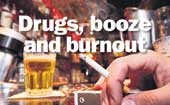 |
It’s 6.30 aM and Rahul, 25, has already hit the local bar to unwind after a hard night’s work. And Rahul is not alone — he is a part of Mumbai’s young workforce from the outsourcing industry, which is increasingly turning to alcohol and drugs as stress busters.
The BCom graduate sought professional help after his family saw that abuse of cannabis and hard liquor was leading him to new lows. There was a time when he smoked a cigarette or two to add cool to his highlighted hair and designer wear. The number of tobacco cigarettes spiralled to 15 or 20 in no time. And before he knew it, he had taken to smoking hashish, rolling three or four joints a day.
Rahul, doctors warn, is only one of the increasing number of young and visible faces from the BPO industry to get consumed by drugs and alcohol. They have money to spend, their working hours are long and erratic and they are in an environment dominated by the young. All together, it could be a formula for trouble.
Last week, the Bombay Psychiatric Society devoted an entire evening to discussing the issue. Rahul’s case came up as well. The increase in the intake of potent stuff had caused a whole range of physical problems for him, too. He complained of a persistent cough, breathlessness, loss of appetite, abdominal pain and irritability. Doctors said he was suffering from an “amotivation syndrome”, which leads to dipping performance levels at work — a fallout of cannabis dependence.
Shilpa Adharkar, the secretary of the society, believes that this could just be the tip of the iceberg. And she has a point there, for at the Detoxification Centre of Sevadaan, a Mumbai-based non governmental organisation working in the area of substance abuse, 20 per cent of those on a drug and alcohol rehabilitation programme are those from the BPO industry, says the centre’s psychiatrist, Kartik Rao. And 10 per cent of patients at detoxification centres run by Kripa Foundation for alcohol and drug abuse come from call centres, points out G. Srinivas, a liaison development executive at Kripa.
Most of those seeking help are in their mid-twenties, some are even younger. The reasons for substance abuse are common. Often it is a result of stress on the shopfloor. Sometimes, it is peer pressure. What starts as a way of easing tension — a shared smoke in the vehicle carrying them back home — soon becomes a habit.
Drivers are often encouraged to roll joints for the young occupants, or share drinks. In the process, at least one such driver ended up getting hopelessly addicted to cannabis, which he had to take about five to six times a day. Sunil, a call centre employee in Mumbai, says he injured his leg recently when the drunken driver of the official vehicle drove straight into a gutter in the middle of the night.
Says Suhel, a trainer at a call centre: “Drivers of company transport are instructed not to allow employees to smoke in the company transport. But they do get friendly with employees and allow them to smoke. After all, the administration department cannot keep a watch on their every move.”
With more and more people hitting the bottle at the end of a late night shift, it is not uncommon for bars in the city’s suburbs to open early in the morning, says Vinod Shetty, a labour lawyer who represents call centre employees through an outfit called Young Professionals’ Collective in Mumbai. “These bars even have special compartments for BPO employees,” adds Shetty.
Savio, a BPO employee, spends half his monthly salary of Rs 15,000 on drinking in Mumbai’s pubs over weekends. Hardly in his early twenties, this team leader has already moved to hard liquor — downing nothing less than six to seven pegs of vodka every evening. “But most of my colleagues around my age are moving from beer and vodka to whisky,” he says.
The more adventurous though, don’t even wait for their shifts to get over. “For some, nothing is too dangerous — not even drinking or doping in office during breaks,” says Anjali Sharma, a former BPO employee. “They even manage to escape the checks at entry point,” she says. A 25-year-old call centre employee in Mumbai got transported to dizzying heights through a cigarette that he borrowed from a female colleague on one of his breaks on duty. “She later told me she had mixed the tobacco with marijuana,” he says. The girl was only 23, and addicted to marijuana.
“People smoked marijuana even in chillums during breaks in a corner of the office cafetaria,” he says.
Not surprisingly, experts are concerned by the high intake of drugs and alcohol in the industry. Some believe that substance abuse is directly related to high levels of stress and frustration on the job. But Shiva, a call centre employee, believes the problem is that the young — many of them just out of college — suddenly have access to a lot of money, for salaries are good even for fresh graduates.
“They’re not mature enough to handle so much of money,” says Shiva. Moreover, he points out that odd shifts and working hours force them to find their own forms of recreation. “They can’t go home at a decent hour and play a sport like an employee in another sector,” he adds.
Yusuf Matcheswalla, a psychiatrist in Mumbai who has a sizeable clientele from the BPO industry, has another take on the subject. Many of those coming to him to be treated for alcohol and drug dependence are already borderline cases — people with personality disorders, into drinking and drugs. Lawyer Shetty adds: “Because of the timings and money, this is one industry that can sustain their addictions.”
Blame it on call centres? Or is that a distress call waiting to be answered?











